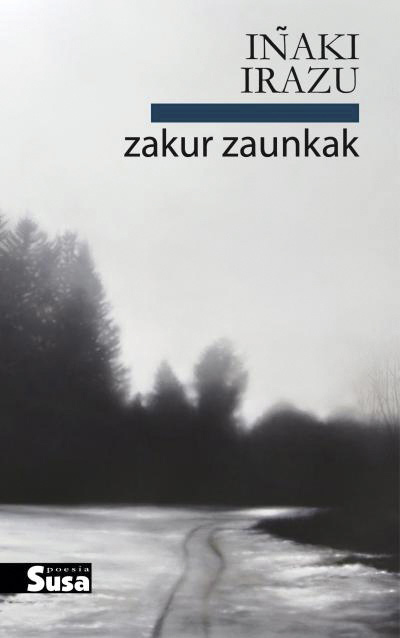

Dog barking
Iñaki Irazu
Susa, 2023
---------------------------------------------------
The latest edition of Iñaki Irazu (Asteasu, 1954), in black and white, has a blurry cover. However, the footprint of a road is visible on the ground: without direction marks we cannot know if we get here and look back or, following it, the conjecture that indicates reaching somewhere. This post, second in the trajectory of the Asteasuarra, is, as the first, an invitation to the transit of memory, composed by the poem Hegei, called Zakur zaunka (Susa, 2023), twenty fortifications for those who cast a refuge in memory.
Civil War and post-war are the axes of the collection: The Martutene prison, the stables, the Civil Government of San Sebastian, the palaces of Neguri, the Salburua tent, the margins of cemeteries and slaughterhouses, etc., can be found on the proposed route. In places where the present is related to the past, the poet gathers strong images: heaps of herbs perforated with lattice, stickers swallowed, a claw resting on the neck... Some have red heat, others have metal cold. In addition to those that can awaken the sensory memory of the non-living, the importance that the poet attaches to the word is interesting: The poem is a clear exponent of this during dinner.
The latter directly influences the formal composition of the collection. In fact, we could say that Irazu has worked as a collector of stories everywhere: he has captured in the book the words of others and even the expressions of others, as well as those that will be known by the reader in the poem A red key. With this, therefore, in poems other brands of people predominate in comparison to the poetic self, since they contain certain testimonies with narrative tints. In general, the voices and echoes of the place trace the silence associated with the roughness of the lived, the repression suffered and the pain felt.
Besides resembling the way back and forth, memory resembles the reflection of sound. Apparently, the necessary margin is essential for the sounds produced at some point before the echo to be audible for us: “Walking on the mountain / road, / to grab us / powerless / ear / remote bark / old dog”. These words serve to gradually approximate the past as this interval increases.